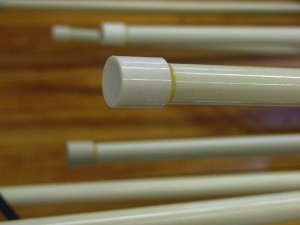Smart Radios, Dumb Institutions
May 21st, 2010 by Christian(or: The Wonderful World of the Electromagnetic Spectrum)
(click to go to the podcast)
“It sounds like the most boring topic in existence…” producer Dan Jones playfully used this quote (from me) to lead this week’s Radio Berkman podcast. Our topic is the future of the electromagnetic spectrum. David Weinberger skillfully interviews me about wireless. As you may have noticed as you squint at this blog post on your smartphone, the future of the Internet is wireless. My goal in the conversation was to try to talk about some of the most exciting and revolutionary ideas in wireless today without acronyms and jargon. Hopefully I can prove it is not the most boring topic in existence.
Here’s a link to the audio (downloadable and playable from the browser): http://cyber.law.harvard.edu/node/6109 (~42 minutes)
Below I’ve typed up a summary of the big points in the podcast.
A diagram from experimental License 5XD, granted in 1920
to the New Mexico College of Mechanical and Agricultural Arts
(click to enlarge)
To my mind, the big points in our conversation are these nine paragraphs:
I try to explain what the “electromagnetic spectrum” is in layman’s terms, by reference to the French National Assembly and comparing the term to “the political spectrum.”
A discussion of how the topic of radio appears to be very technical, but in fact many or even most of the important decisions about it are social and political. We think that the future of wireless technology is all about improvements in technology — when in fact the biggest obstacles to positive change in our wireless communication systems are entrenched interests, laws, policies, and institutions. Technical jargon is a way to keep us out of vital conversations by making them seem arcane, boring, and specialist.
As an example, I talk about how “channels” seem like an important feature of radio technology, when in fact they are a human superposition that now locks us into 100-year-old ways of thinking about wireless. New wireless technologies also suggest a re-imagining of the spectrum itself and how we use it (one example I talk about is open spectrum).
I say that wireless is now experiencing a crisis of metaphor. Because we don’t personally experience electromagnetism (very much) metaphor is a crucial tool that we use to reason about how radio works and how it ought to work, particularly in venues where policy discussion of wireless occurs. We used to use the metaphor of water. We also have historically used roads, rails, land, gears (!), color, and clouds. New developments in wireless (e.g., cognitive radio) don’t mesh well with our old metaphors and thus we are struggling. It may be that the new metaphor for wireless is The Internet.
I talk about how Wi-Fi may be a small example of how we might think about all wireless systems in the future (taking a page from Kevin Werbach). Anyone can buy a Wi-Fi access point without permission, and most users never have to think about what “channel” they are on when they use Wi-Fi. Newer Wi-Fi access points also do a simple version of smart frequency selection to avoid interference. What if everything wireless looked like this? This would involve embedding a lot more intelligence in our devices.
Letting go of channels and letting go of the requirement that broadcasters obtain government permission in advance to use a channel (that is, licenses) is scary for those who control channels now. But it’s also scary for people who worry that without licensing there will be bedlam and interference as everyone tries to use the same channels at the same time. I talk about how we can learn from the (unlicensed) experience of Wi-Fi to prevent this kind of problem.
I argue that wireless use is actually predictable without licensing transmitters in advance. I use an analogy with a “Guess Your Weight” game at a carnival and I propose to “Guess Your Wi-Fi.” Here is a Web site based on the research I discuss where you can play the “Guess Your Wi-Fi” experiment I am talking about, and learn more about this topic: http://pact.uiuc.edu/red/
I observe that in early radio everyone was expected to know everything about the technical details of radio. (You built your own radio set or you didn’t have one.) As wireless commercialized, the only thing the users needed to know was how to change the channel on the TV. Now we’re moving back toward early radio again in that more and more information and technical details are being foisted onto the consumer. (Just look around the aisles at Best Buy at the cordless phones, or try to buy a USB stick for your laptop that gives you access to the cellular network.) This is a bad trend. Open spectrum doesn’t need to mean that the user does everything on their own! Everyone doesn’t need to be their own band manager.
I talk about the prospects for future devices that share the electromagnetic spectrum in new ways. I argue that future protocols and regulations need to encapsulate new kinds of rules about polite sharing in order to ensure that a new system like this works. However, there’s a trade-off between highly regulated nice and polite smart radios that work well together and the speed of innovation in smart radios.
As always, your comments are welcome.


May 22nd, 2010 at 10:57 am
The big problem with wireless policy is that we think of wireless bits as different from wired bits. Thus we create scarcity. More at http://rmf.vc/?n=SpectrumDirt